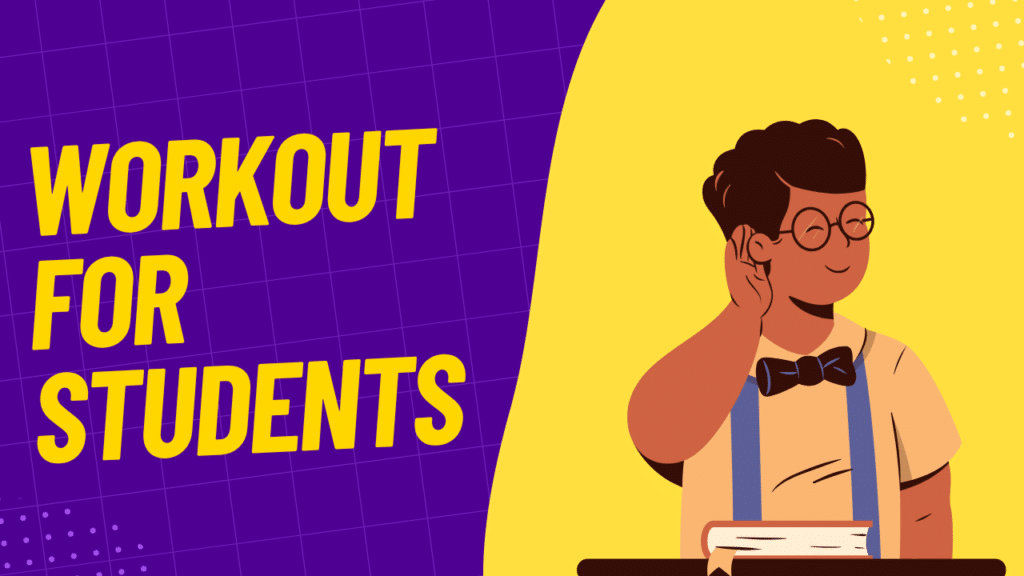
Introduction –
Exams are stressful for students. The pressure to perform, sitting for long hours, and a lack of movement can take a toll on both physical and mental health. While studying is the top priority, neglecting your body can actually reduce your focus, energy and efficiency. You do not need to go to the gym for hours to stay healthy.
Even short easy workouts can make a massive difference during exam season.
Here are some easy and quick workouts that students can incorporate into their daily routine without disrupting study schedules.
Given below is the list of easy workouts for students during exams:
1. Stretch Breaks: Reset your body and mind-
Sitting for long hours may lead to stiffness and poor posture, which may cause fatigue. Take a 5-minute break every hour to reset your muscles and refocus your mind.
You may try the following:
Neck rolls ( 10 times each side)
Shoulder shrugs and Circles forward bend ( touch your toes and hold for 20 seconds)Spine twist ( Seated or standing)Wrist and finger stretches ( Recommended if you type or write a lot)
2. Chair Workouts – Exercise without leaving your study spot:
If you don’t have time to leave your desk, try simple chair exercises. These workouts will help you keep your blood flow normal.
You may try the following:
Seated leg raises ( 10-15 reps per leg) Seated marching ( lift your knees alternatively)Arm circles and punches in the air Desk pushups ( Place hands on the desk edge and push like a regular pushup)
These workouts will take just a few minutes and help reduce muscle tension while boosting your energy.
3. Bodyweight exercises: Quick and Effective –
Ten minutes of bodyweight exercises will improve circulation, reduce stress and sharpen your focus.
You may try the following:
Jumping Jacks- 1 Minute wall Sit- 30 Seconds squats- 15 Reps pushups – 10-15 Reps plank – 30 seconds
If you have time, you can repeat this set 2 or 3 times. No equipment is needed, and you can do it in your room.
4. Yoga for stress relief and focus:
Yoga is an excellent tool during exams. It combines movement, breathing and mindfulness.
You may try the following:
Child’s Pose Cat-cow Stretch downward DogLegs up the wall Easy seated twist
Even 10-15 minutes of yoga can help you feel relaxed and rejuvenated.
5. Walking: The Underrated Super Exercise:
Never underestimate the power of a walk. Taking a short walk around your room, balcony, or outside helps clear mental clutter and boosts creativity.
You may try the following:
Walk for 10-15 minutes between study sessions.Try walking while listening to a recorded lecture or reviewing flashcards.
The activity will keep your metabolism active and boost your mood-enhancing hormone levels.
6. Dance your heart out:
If you need something fun to energise yourself, then put on your favourite upbeat song and dance around your room for 3-5 minutes. It will be a great cardio workout and an instant mood lifter.
7. Stair Climbing:
If you have stairs at home or in the building, use them.
You may try the following:
Walk or jog up and down for 5-10 minutes Increase your speed or number of steps gradually
8. Resistance band exercises :
A student may also go for strength training. Use affordable, portable resistance bands. You may try the following:Bicep CurlsShoulder PressesLateral band walksGlute bridges with bandsThis will help you improve your strength without heavy weight lifting.
9. Shadow Boxing:
If you wish to burn calories and release stress through a fun activity, then there can be nothing better than shadowboxing.You may try the following:Stand with your feet shoulder-width apart and punch the air in controlled, quick combos.Mimic real sparring by adding foot movement.This is a good cardio exercise and a great way to relieve stress.
10. HIIT (High-intensity Interval training) –
Short, intense bursts of exercise followed by rest.You may try the following:30 seconds of jumping jacks30 seconds of rest30 seconds of mountain climbers30 seconds rest30 seconds of high knees 30 seconds restThis will help with efficient fat-burning and boost energy in a short time.
11. Breathing and core Engagement:
Even if you are sitting, you can still work on your core. You may try the following:Sit upright Inhale DeeplyContract your abdominal muscles as you exhaleHold it for a few seconds and then repeatThis will help you fight anxiety by building your core strength and improving your breathing.
Why is it essential to stay active during exams?
Staying active during exams helps in many ways:
Improves Concentration reduces anxiety and Stress improves sleep Quality increases the circulation of blood to the Brain prevents back and neck pain
Here are a few more tips:
Move proactively; do not wait until you are Exhausted treat physical activity as a reward between your study Block stay hydrated and rely on balanced diets
Conclusion:
Exams can be tough, but you do not have to choose between health and success. Incorporating these easy workouts into your daily routine can keep your body full of energy and your mind more focused.